[PDF&VCE] New Lead2pass 100-105 Dumps PDF Version Released For Free Downloading (101-120)
2016 September Cisco Official New Released 100-105 Dumps in Lead2pass.com!
100% Free Download! 100% Pass Guaranteed!
Lead2pass updates Cisco 100-105 exam questions, adds some new changed questions from Cisco Official Exam Center. Want to know 2016 100-105 exam test points? Download the following free Lead2pass latest exam questions today!
Following questions and answers are all new published by Cisco Official Exam Center: http://www.lead2pass.com/100-105.html
QUESTION 101
An administrator must assign static IP addresses to the servers in a network. For network 192.168.20.24/29, the router is assigned the first usable host address while the sales server is given the last usable host address. Which of the following should be entered into the IP properties box for the sales server?
A. IP address: 192.168.20.14
Subnet Mask: 255.255.255.248
Default Gateway: 192.168.20.9
B. IP address: 192.168.20.254
Subnet Mask: 255.255.255.0
Default Gateway: 192.168.20.1
C. IP address: 192.168.20.30
Subnet Mask: 255.255.255.248
Default Gateway: 192.168.20.25
D. IP address: 192.168.20.30
Subnet Mask: 255.255.255.240
Default Gateway: 192.168.20.17
E. IP address: 192.168.20.30
Subnet Mask: 255.255.255.240
Default Gateway: 192.168.20.25
Answer: C
QUESTION 102
What is the default administrative distance of the OSPF routing protocol?
A. 90
B. 100
C. 110
D. 120
E. 130
F. 170
Answer: C
Explanation:
Default Distance Value Table
This table lists the administrative distance default values of the protocols that Cisco supports:
If the administrative distance is 255, the router does not believe the source of that route and does not install the route in the routing table.
QUESTION 103
What is the subnet address for the IP address 172.19.20.23/28?
A. 172.19.20.0
B. 172.19.20.15
C. 172.19.20.16
D. 172.19.20.20
E. 172.19.20.32
Answer: C
QUESTION 104
The network administrator has found the following problem. The remote networks 172.16.10.0, 172.16.20.0, and 172.16.30.0 are accessed through the Central router’s serial 0/0 interface.
No users are able to access 172.16.20.0. After reviewing the command output shown in the graphic, what is the most likely cause of the problem? 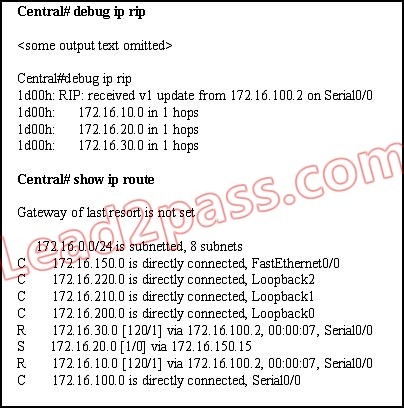
A. no gateway of last resort on Central
B. Central router’s not receiving 172.16.20.0 update
C. incorrect static route for 172.16.20.0
D. 172.16.20.0 not located in Central’s routing table
Answer: C
QUESTION 105
Refer to the exhibit. The output is from a router in a large enterprise. From the output, determine the role of the router. 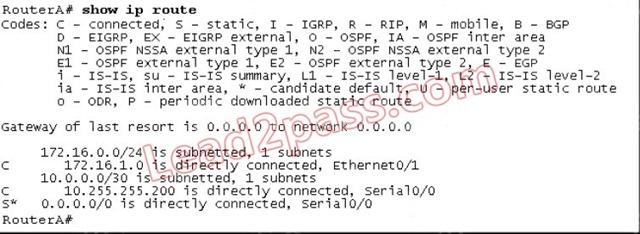
A. A Core router.
B. The HQ Internet gateway router.
C. The WAN router at the central site.
D. Remote stub router at a remote site.
Answer: D
QUESTION 106
Refer to the exhibit. For security reasons, information about RTA, including platform and IP addresses, should not be accessible from the Internet. This information should, however, be accessible to devices on the internal networks of RTA. Which command or series of commands will accomplish these objectives? 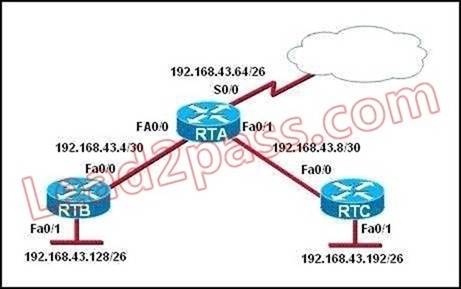
A. RTA(config)#no cdp run
B. RTA(config)#no cdp enable
C. RTA(config)#interface s0/0
RTA(config-if)#no cdp run
D. RTA(config)#interface s0/0
RTA(config-if)#no cdp enable
Answer: D
QUESTION 107
Refer to the exhibit. The two connected ports on the switch are not turning orange or green. What would be the most effective steps to troubleshoot this physical layer problem? (Choose three.) 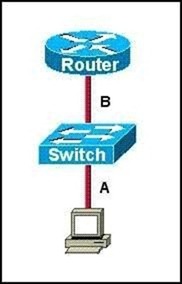
A. Ensure that the Ethernet encapsulations match on the interconnected router and switch ports.
B. Ensure that cables A and B are straight-through cables.
C. Ensure cable A is plugged into a trunk port.
D. Ensure the switch has power.
E. Reboot all of the devices.
F. Reseat all cables.
Answer: BDF
QUESTION 108
Wich command can you use to manually assign a static IPV6 address to a router interface?
A. ipv6 address PREFIX_1::1/64
B. ipv6 autoconfig 2001:db8:2222:7272::72/64
C. ipv6 autoconfig
D. ipv6 address 2001:db8:2222:7272::72/64
Answer: D
QUESTION 109
The network administrator is using a Windows PC application that is called putty.exe for remote communication to a switch for network troubleshooting. Which two protocols could be used during this communication? (Choose two).
A. SNMP
B. HTTP
C. Telnet
D. RMON
E. SSH
Answer: CE
QUESTION 110
What should be part of a comprehensive network security plan?
A. Allow users to develop their own approach to network security.
B. Physically secure network equipment from potential access by unauthorized individuals.
C. Encourage users to use personal information in their passwords to minimize the likelihood of passwords
being forgotten.
D. Delay deployment of software patches and updates until their effect on end-user equipment is well known
and widely reported.
E. Minimize network overhead by deactivating automatic antivirus client updates.
Answer: B
QUESTION 111
Which two of these statements are true of IPv6 address representation? (Choose two.)
A. There are four types of IPv6 addresses: unicast, multicast, anycast, and broadcast.
B. A single interface may be assigned multiple IPv6 addresses of any type.
C. Every IPv6 interface contains at least one loopback address.
D. The first 64 bits represent the dynamically created interface ID.
E. Leading zeros in an IPv6 16 bit hexadecimal field are mandatory.
Answer: BC
Explanation:
http://www.cisco.com/en/US/technologies/tk648/tk872/technologies_white_paper0900aecd 8026003d.pdf
A single interface may be assigned multiple addresses of any type (unicast, anycast, multicast).
Every IPv6-enabled interface must contain at least one loopback and one link-local address.
Optionally, every interface can have multiple unique local and global addresses. IPv6 host addresses can be assigned in multiple ways:
Static configuration
Stateless autoconfiguration
DHCPv6
When IPv6 is used over Ethernet networks, the Ethernet MAC address can be used to generate the 64-bit interface ID for the host. This is called the EUI-64 address. Since MAC addresses use 48 bits, additional bits must be inserted to fill the 64 bits required.
QUESTION 112
A network administrator cannot connect to a remote router by using SSH. Part of the show interfaces command is shown.
router#show interfaces
Serial0/1/0 is up, line protocol is down
At which OSI layer should the administrator begin troubleshooting?
A. physical
B. data link
C. network
D. transport
Answer: B
Explanation:
https://learningnetwork.cisco.com/thread/12389
I think the indication here is “Serial 0 is up, line protocol is down”. What causes this indication? Correct me if I am wrong. When you have this indication, a cable unplugged is not a correct answer. If you check the output of your “show interface serial 0” command again, you should notice it as “Serial 0 is down, line protocol is down. Under the “show ip int brief” you should see status = down and protocol = down as opposed to up, down. Because you disconnected the cable, layer 1 will go down, which is indicated by the serial 0 down status. The line protocol status is for layer 2. So, a cable unplugged is not a correct answer to “Serial 0 is up, line protocol is down”. Hope this helps.
QUESTION 113
Refer to the exhibit. A person is trying to send a file from a host on Network A of the JAX Company to a server on Network Z of the XYZ Company. The file transfer fails. The host on Network A can communicate with other hosts on Network A. Which command, issued from router RTA, would be the most useful for troubleshooting this problem? 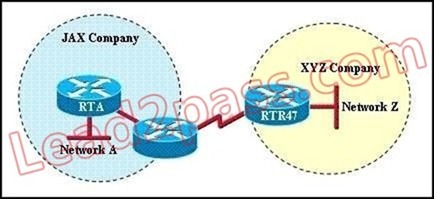
A. show flash:
B. show history
C. show version
D. show interfaces
E. show controllers serial
Answer: D
QUESTION 114
Refer to the exhibit. A user cannot reach any web sites on the Internet, but others in the department are not having a problem. What is the most likely cause of the problem? 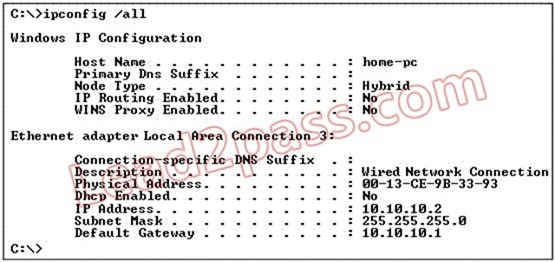
A. IP routing is not enabled.
B. The default gateway is not in the same subnet.
C. A DNS server address is not reachable by the PC.
D. A DHCP server address is not reachable by the PC.
E. NAT has not been configured on the router that connects to the Internet.
Answer: C
QUESTION 115
Which option is a valid IPv6 address?
A. 2001:0000:130F::099a::12a
B. 2002:7654:A1AD:61:81AF:CCC1
C. FEC0:ABCD:WXYZ:0067::2A4
D. 2004:1:25A4:886F::1
Answer: D
Explanation:
http://www.ipv6.com/articles/general/IPv6-Addressing.htm
IPv6 Address Notation
IPv6 addresses are denoted by eight groups of hexadecimal quartets separated by colons in between them.
Following is an example of a valid IPv6 address:
2001:cdba:0000:0000:0000:0000:3257:9652
Any four-digit group of zeroes within an IPv6 address may be reduced to a single zero or altogether omitted.
Therefore, the following IPv6 addresses are similar and equally valid:
2001:cdba:0000:0000:0000:0000:3257:9652
2001:cdba:0:0:0:0:3257:9652
2001:cdba::3257:9652
The URL for the above address will be of the form:
http://[2001:cdba:0000:0000:0000:0000:3257:9652]/
QUESTION 116
What is the purpose of the switchport command?
Switch(config-if)# switchport port-security maximum 1
Switch(config-if)# switchport port-security mac-address 0018.DE8B.4BF8
A. It ensures that only the device with the MAC address 0018.DE8B.4BF8 will be able to connect to
the port that is being configured.
B. It informs the switch that traffic destined for MAC address 0018.DE8B.4BF8 should only be sent to
the port that is being configured.
C. It will act like an access list and the port will filter packets that have a source or destination MAC
of 0018.DE8B.4BF8.
D. The switch will shut down the port of any traffic with source MAC address of 0018.DE8B.4BF8.
Answer: A
QUESTION 117
Refer to the exhibit. A network administrator is troubleshooting a connectivity problem on the serial interfaces. The output from the show interfaces command on both routers shows that the serial interface is up, line protocol is down. Given the partial output for the show running-config in the exhibit, what is the most likely cause of this problem? 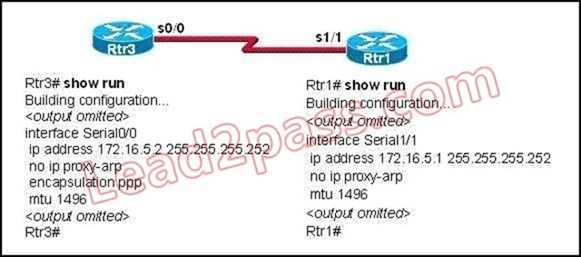
A. The serial cable is bad.
B. The MTU is incorrectly configured.
C. The Layer 2 framing is misconfigured.
D. The IP addresses are not in the same subnet.
Answer: C
QUESTION 118
How many bits are contained in each field of an IPv6 address?
A. 24
B. 4
C. 8
D. 16
Answer: D
Explanation:
http://www.cisco.com/en/US/technologies/tk648/tk872/technologies_white_paper0900aecd 8026003d.pdf
One of the key advantages IPv6 brings is the exponentially larger address space. The following will outline the basic address architecture of IPv6.
128-bit-long addresses
Represented in hexadecimal format:
Uses CIDR principles: prefix/prefix length
x:x:x:x:x:x:x:x, where x is a 16-bit hex field
The last 64 bits are used for the interface ID
QUESTION 119
Refer to the exhibit. The DHCP settings have recently been changed on the DHCP server and the client is no longer able to reach network resources. What should be done to correct this situation? 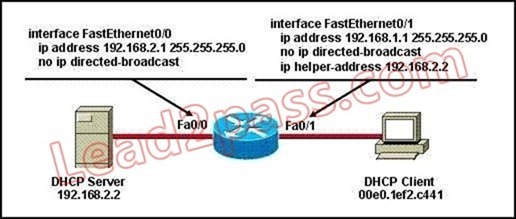
A. Verify that the DNS server address is correct in the DHCP pool.
B. Ping the default gateway to populate the ARP cache.
C. Use the tracert command on the DHCP client to first determine where the problem is located.
D. Clear all DHCP leases on the router to prevent address conflicts.
E. Issue the ipconfig command with the /release and /renew options in a command window.
Answer: E
QUESTION 120
Which three approaches can be used while migrating from an IPv4 addressing scheme to an IPv6 scheme (choose three)
A. static mapping of IPv4 address to IPv6 addresses
B. configuring IPv4 tunnels between IPv6 islands
C. use DHCPv6 to map IPv4 addresses to IPv6 addresses
D. use proxying and translation (NAT-PT) to translate IPv6 packets into IPv4 packets
E. configure IPv6 directly
F. enable dual-stack routing
Answer: BDF
Explanation:
http://www.opus1.com/ipv6/howdoitransitiontoipv6.html
Connecting IPv6 islands with tunnels
An IPv6 island is a network made of IPv6 links directly connected by IPv6 routers. In the early days of IPv6 deployment, there are many IPv6 islands. IPv6 in IPv4 tunnels are used to connect those islands together. In each island, one (or more) dual stack routers are designated to encapsulate and decapsulate IPv6 packets within IPv4 packets. Different mechanisms have been developed to manage tunnels: automatic tunnels3, configured tunnels3, tunnel brokers3, 6over43, 6to43,…
http://www.petri.co.il/ipv6-transition.htm
Network Address Translation – Protocol Translation (NAT-PT) The NAT-PT method enables the ability to either statically or dynamically configure a translation of a IPv4 network address into an IPv6 network address and vice versa. For those familiar with more typically NAT implementations, the operation is very similar but includes a protocol translation function. NAT-PT also ties in an Application Layer Gateway (ALG) functionality that converts Domain Name System (DNS) mappings between protocols.
Dual Stack
The simplest approach when transitioning to IPv6 is to run IPv6 on all of the devices that are currently running IPv4. If this is something that is possible within the organizational network, it is very easy to implement.
However, for many organizations, IPv6 is not supported on all of the IPv4 devices; in these situations other methods must be considered.
Lead2pass promise that all 100-105 exam questions are the latest updated, we aim to provide latest and guaranteed questions for all certifications. You just need to be braved in trying then we will help you arrange all later things! 100% pass all exams you want or full money back! Do you want to have a try on passing 100-105?
100-105 new questions on Google Drive: https://drive.google.com/open?id=0B3Syig5i8gpDWUdDVE1SbVBrb1k
2016 Cisco 100-105 exam dumps (All 274 Q&As) from Lead2pass:
http://www.lead2pass.com/100-105.html [100% Exam Pass Guaranteed]